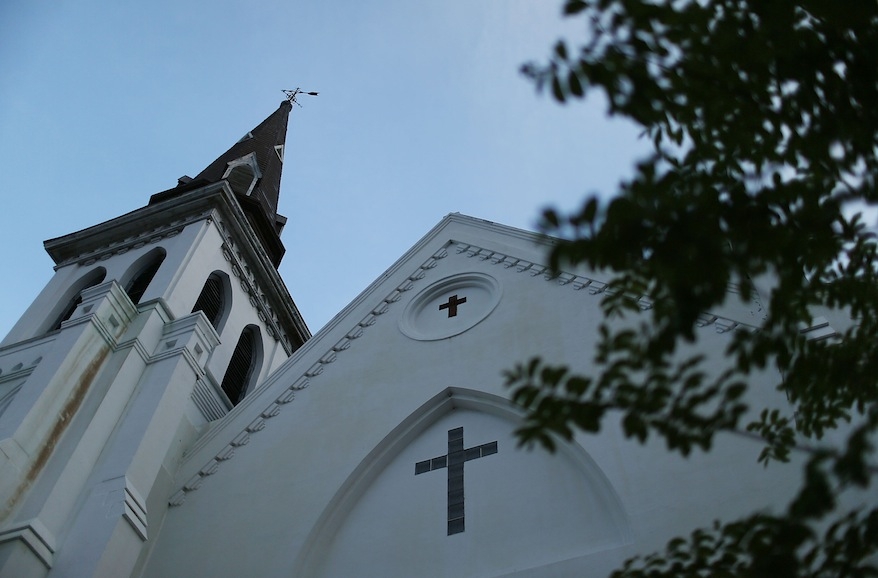
The deadly shooting at the Emanuel AME Church in Charleston provided a focal point for a terror attack simulation for national Jewish leaders. (Joe Raedle/Getty Images)
WASHINGTON (JTA) – When the Department of Homeland Security convened a terror attack simulation for national Jewish leaders, they returned again and again to last month’s deadly shooting attack on a historic black church in Charleston, South Carolina.
Last week’s simulation, known as a “tabletop” exercise, posits a possible attack, depicted as a series of news bulletins on a fictitious all-news channel. A moderator solicits responses and questions. There have been numerous such simulations in recent years at the state and national levels.
Although the exercise was based on recent attacks on Jewish institutions in the United States and abroad, it was the shock of the shooting at Charleston’s Emanuel AME Church on June 17 that informed many of the questions. That attack, which killed nine worshippers, went to the heart of the tension that has defined worship in the era following the Sept. 11, 2001 attacks, participants and organizers said: how to balance security with deep-seated religious traditions of welcome.
“I’ve witnessed discussions about what the presence of security personnel outside faith-based institutions can mean and how it can be foreboding,” Alejandro Mayorkas, the deputy Homeland Security secretary, told JTA in an interview after the exercise, which he attended.
The event took place in an office building here and was off the record.
Prior to the simulation, top Jewish leaders at the session also met with Jeh Johnson, the Homeland Security secretary. The Jewish Federations of North America, representatives of the major Jewish religious streams, the Conference of Presidents of Major American Jewish Organizations and the Anti-Defamation League were among the organizations represented at the exercise. Along with the Department of Homeland Security, representatives from the FBI and state agencies also participated.
Organizers, including the Secure Community Network, the security arm of national Jewish groups, tweaked the program in recent weeks to include discussion of the Charleston attack. However, the church massacre’s most striking component, the way in which the shooter exploited a welcome-all-comers event, was absent from the simulation.
Dylann Roof, the 21-year-old alleged killer, had attended a Wednesday night prayer meeting for an hour before he began shooting congregants with a handgun. Roof is thought to hold white supremacist views.
With Jewish ritual holding welcome-the-stranger parallels, the Jewish community leaders and law enforcement officials wondered whether any amount of training may have waylaid the Charleston attacker, however well prepared the targeted institution might be.
“Houses of worship were at one time off limits to mass murder,” Paul Goldenberg, SCN’s director, told JTA. Attackers “are now looking at these institutions as a soft target and Achilles’ heel.”
SCN and Homeland Security have worked to create a security environment at U.S. Jewish institutions that does not impinge on everyday activity. The goal, Goldenberg says, is to avoid the extensive security checks that are prevalent at Jewish institutions in Europe. Preventing an atmosphere of barricades in the United States was critical not just for the American Jewish community, but for the broader community as well.
READ: In France, fear and defiance mix 6 months after kosher market attack
Training sessions run by Goldenberg’s SCN have prepared Jewish community officials across the country to spot suspicious behavior and objects, and Homeland Security funding has allocated grants for nonprofits that have improved security at Jewish institutions through the additions of barriers, security cameras and other measures. Jewish institutions have received more than 90 percent of the $164 million disbursed since 2005.
William Daroff, the Washington director of the Jewish Federations of North America, said the need for awareness was especially acute among American Jewish communities.
“We are at greater risk, we have a greater responsibility for situational awareness to make sure we are keeping our community safe,” said Daroff, who attended the session.
READ: Homeland Security bill includes $13 million for religious and other nonprofit groups
One message hammered into session participants was the importance of forming relationships with law enforcement at the local level — a relationship often absent overseas.
Dov Ben Shimon, the executive director of the Jewish Federation of Gretaer Metrowest in New Jersey, said he seized the opportunity of the Washington event to deepen his relationship with New Jersey state law enforcement, which was represented there, too. “I came out of the conference with a renewed and heightened understanding of importance of collaboration and communication on all levels,” he said.
Homeland Security’s Mayorkas, noting that he was about to visit Israel, where he is to sign an agreement this week to jointly research prevention of cyberattacks, said the general awareness there of security threats was one the United States might one day emulate.
READ: Security consultants warn Jewish institutions on cyberattacks
“The general population in Israel, by virtue of its history, has a deep understanding of the security threat and it is ingrained in them, part of their daily life,” he said.
JTA has documented Jewish history in real-time for over a century. Keep our journalism strong by joining us in supporting independent, award-winning reporting.






